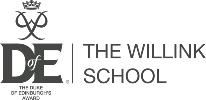English
Curriculum Intent 2025-26
The English curriculum is designed to foster independent, critical thinkers through engagement with a wide range of texts spanning the 19th to 21st centuries. Students encounter diverse genres and voices, exploring both literary classics and contemporary works. Core texts include drama, novels, and poetry from writers such as Shakespeare, Dickens, Ros and Sheriff, alongside poets like Duffy and Agard. These are enriched by non-fiction materials and critical readings that provide insight into historical and societal contexts.
Through these texts, we aim to develop students’ understanding of the world and their place within it, encouraging reflection on personal identity and the experiences of others. As they progress, students gain confidence and depth in analysing literary conventions, themes, and authorial intent. The curriculum also provides a platform to explore and reinforce core values such as tolerance, justice, and respect, through discussion of social, moral, and ethical issues raised in literature.
Our approach builds skills in reading, writing, and oracy. Students are supported in developing sophisticated inferences, precise vocabulary, and confident, respectful communication. They are encouraged to articulate ideas clearly and listen actively, becoming thoughtful contributors and evaluators in both written and spoken contexts.
Assessment is integral to monitoring progress. Each year group undertakes regular milestone tasks that assess a broad range of skills, offering a comprehensive picture of achievement against individual flightpaths. More able students are challenged through analytical tasks, vocabulary work, oracy assessments, and debate. All students benefit from targeted support such as Engage with English, carousel interventions, and Walking-Talking Mocks, ensuring progress at every level.
In Key Stage 3, students are taught in mixed-ability groups to promote inclusivity and support, while Key Stage 4 uses banding to offer targeted challenge. At Key Stage 5, students can choose A-Level Literature or Language, studying demanding and enriching content. We build continuity across Key Stages through initiatives such as the Paired Reading Programme and sixth-form involvement in enrichment activities.
Reading for pleasure is a key focus, aligned with the school’s Read to Achieve initiative. Fortnightly library lessons, guided by our librarian, help students discover and develop independent reading habits. The weekly Sparx Reader homework further promotes purposeful reading. Students are encouraged to select texts that both engage and challenge them.
Beyond the classroom, students have access to a rich programme of extracurricular opportunities. These include the creative writing club, national writing competitions, book journalling, the Mock Trial competition at Reading Crown Court, visits from touring theatre companies, author events, and participation in Poetry by Heart. These experiences broaden students’ cultural understanding and foster a lifelong love of English.
Key Staff
- Mrs H Sayers - Head of English Department, Associate Assistant Headteacher in charge of Teaching and Learning
- Mr T Wall - Second in English Department & KS4 Coordinator
- Mrs E Rutherford, Third in Department & KS3 coordinator
- Mr R Morgan - Professional Development Coordinator & Teacher of English
- Miss J Evans, Deputy Director for the Teaching School Hub Berkshire & Teacher of English
- Mrs C Gibbons - Teacher of English & Literacy Coordinator
- Ms S Parker - Teacher of English & Academic Writing Lead
- Mrs L Holloway - Teacher of English & English Intervention Teacher and Coordinator
- Mr E Kenny - Teacher of English & More Able and Aspiring Lead
- Mrs C Campbell - Teacher of English
- Mrs S Bean - Teacher of English & MFL
- Mrs E Jeffcoate, Department Learning Support Assistant
Key Stage 3 - Year 7, 8 and 9
English KS3 Topics & Skills 2025/26-
Novels - such as: 'Trash' (Andy Mulligan), 'Great Expectations' (Charles Dickens), 'The Blue Book of Nebo' (Manon Steffan Ros), 'Long Way Down' (Jason Reynolds)
- Plays - 'Journey's End' (R.C. Sherriff), 'Much Ado about Nothing' and 'Romeo and Juliet' (Shakespeare)
- Poetry - World War One poetry, English Literary Heritage Poetry, Poetry from Diverse Perspectives and Cultures
- Non-Fiction - autobiographies, travel writing, persuasive writing
Key Stage 4 (GCSE) - Years 10 & 11
At Key Stage 4, students study the AQA Specifications for English Language and also for English Literature.
| How to do I revise for English Language and English Literature? | |
Key Stage 5 (AS and A Levels) - Years 12 and 13
At Key Stage 5, student study English Literature with Edexcel or English Language with AQA.
Extracurricular
We offer a range of clubs such as a creative writing club, book journalling and debate club. The English department also participates in national competitions and initiatives including: the Magistrate Mock Trial competition, Poetry by Heart; shadowing the Carnegie book prize. During the year, we offer opportunities to see productions of Key Stage 4 drama texts (such as at the RSC or Windmill) or invite touring companies to perform abridged productions. In conjunction with the School Learning Resource centre, we also have author visits Key Stage 3.
Last Updated January 2026







